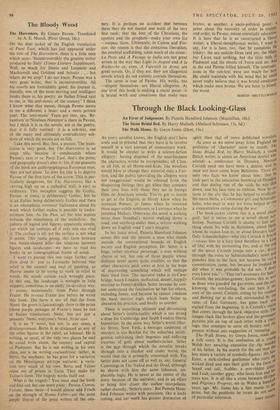Through the Black Looking-Glass
As every novelist knows, the English don't have souls and to pretend that they have is to involve oneself in a vast amount of unnecessary work. It would be simpler to write a science-fiction allegory : having disposed of the soul-business the characters would be recognisable; all Class, or all Job, or all Home-and-Kids. The novelists would have to change their material only a frac- tion, and the public (providing the allegory were not exaggerated) would be released from the disquieting feelings they get when they compare their own lives with those they see in foreign films or American novels. You've got to invent to get at the English, as Hardy knew when he invented Wessex, or James when he invented those super-subtle noblemen, or Lawrence when he invented Mellors. Otherwise the novel is nothing more than Stendhal's mirror walking down a road, and anything duller than a mirror walking down an English road I can't imagine.
In her latest novel, Pamela Hansford Johnson senses this and she invents a man who stands outside the conventional bounds of English society and English perception. Dr. Setter is a huge, rather mystical personage, a man without charm or wit, but one of those people whose dullness never seems quite credible, so that the other characters peck away at him in the hope of discovering something which will reshape their tired lives. The narrator (who is ex-Cam- bridge, South London, ineffectual, decent, happily married to Jenny) dislikes Setter because he can- not understand the fascination he has for others, including Jenny, and because he cannot condone the hard, interior logic which leads Setter to abandon his practice, and finally to murder.
There is something ultimate and devastating about Setter's intellectuality which is too strong a dose for Cambridge and South London liberal humanism. In the same way Setter's world (Har- ley Street, New York, a teenager suspected of murder) is too flexible for the suburban intelli- gentsia cultivating their begonias and suffering traumas of guilt about mothers-in-law. Setter is the gap through which the novelist breaks through into a blacker and realer world, the world that she is primarily concerned with. Yet Setter does not come off as well as, say, General Cummings in The Naked and the Dead, although he shares with him the same inhuman, im- placable logic. He is never at the centre of the story, because of the narrator; and in an effort to bring him closer the author interpolates, rather clumsily, 'Setter's story.' But Pamela Hans- ford Johnson writes with precision, like a knife cutting, and her work has greater distinction of
spirit than that of more publicised novelist's
As soon as we move away from England the problems of 'character' seem to recede. Vie Stone Bridal Bed, by Harry 14Iulisch, a You" Dutch writer, is about an American dentist who attends a conference in Dresden. Norman Corinth need not have been a dentist, and he need not have come from Baltimore. There are only two facts we know about him: that he took part in the saturation bombing of Dresden, and that during one of the raids he was shot down, and his face torn to ribbons. Now he re- turns to the city that he has helped to eradicate. He meets Hella, a Communist girl, and Schneider' halm, who may or may not have helped to run a concentration camp during the war. The book-jacket claims this is a novel about guilt, but it seems to me a novel about riot' feeling. Norman Corinth is unable to feel anY' thing about his wife in Baltimore, about Hell" whom he makes love to, or about Dresden itseth Only Schneiderhahn—who like Corinth is Jewish —rouses him to a fury (and therefore to a kind of life) with his tormenting lies, and at the end of the novel Corinth jumps into a car, drives, through the ruins to Schneiderhahn's hotel all' punches him in the face, not because he rail concentration camp, but because he implied 11,c1 did when it was probable he did not. d°11,, even know you!'—`That isn't necessary for hatel[ Corinth, the machine-gunner, knows this as well as those who guarded the gas-ovens, and the not e knowing, the not-feeling, the easy hate is th„, core of the novel. Corinth, sitting by his crashed and flaming car at the end, surrounded h3( e ruins of East Germany, has gone back an ,.o started from the beginning. It is Corinth's visie that comes through the hard, objective style. images clash like broken glass and the grotesql-li", pictures pile on top of each other with a era;,i'„ logic that attempts to unite all history and,l" present without any suggestion of 'meaning. The Walk Home, by Gwyn Jones, reads irk a folk story. It is the confession of a 3.91-11:g
(
Welsh boy awaiting execution for the 0111,0 of his father. In his search for the old mall boy meets a variety of symbolic figures: the 51.0 Eater, a dark-clothed gentleman who visits t„f wicked dead and eats their guilt in the forth bread and salt, Scabbo, a pox-ridden gl115!; and Leah, another gipsy, who loves him and.ui'ic trays him. It is all like a cross between (VIP"-
red
and Pilgrim's Progress, set in Wales a litthdhi5 years ago. Mr. Jones has a fine music to prose, but the problems he treats do not see


































 Previous page
Previous page